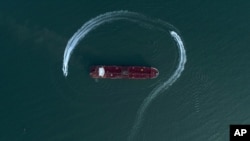Germany has rejected the U.S. call to join an international mission to protect maritime traffic in the Strait of Hormuz.
The United States had asked Germany to join France and Britain in a mission to secure shipping through the strait, the narrow maritime passage through which international tankers transport at least a fifth of the world's crude oil supply.
"Germany will not take part in the sea mission presented and planned by the United States," Germany's Foreign Minister Heiko Maas said Wednesday.
Mass said the situation in the region is very serious but that "there is no military solution."
Tensions have heightened in the Middle East in recent weeks, with the U.S. and Iran announcing they had shot down each other's unmanned drones near the strait.
In addition, Britain seized an Iranian tanker near Gibraltar that London believed was shipping oil to Syria. Iran's Revolutionary Guards responded by taking over the British-flagged oil tanker Stena Impero in the strait. Last week, Britain called for a European-led naval initiative, but Washington has insisted on leading the mission.
European leaders have been reluctant to back a U.S.-led mission, which they say could further escalate tensions in the region.
Tehran and Washington have been at odds since President Donald Trump pulled the U.S. out of an international nuclear deal with Iran and reimposed sanctions on it.
German Finance Minister and Vice Chancellor Olaf Scholz said it was important to avoid a military escalation in the Persian Gulf region and that a U.S.-led mission carried the risk of being dragged into an even bigger conflict.






